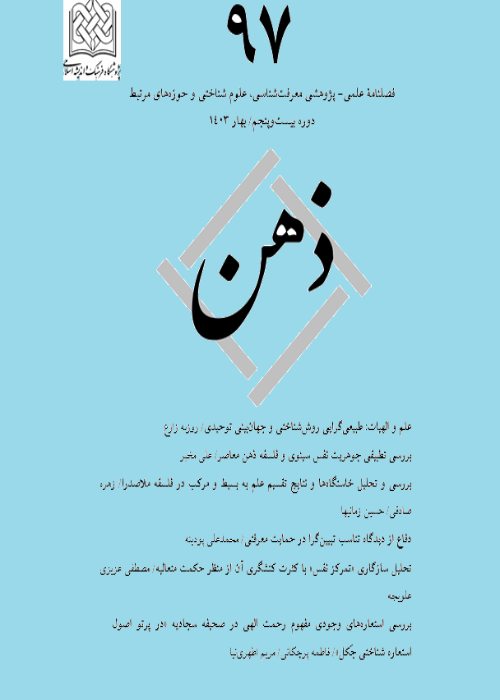Philosophy of Mind from al-Kindi to Averroes
Author(s):
Abstract:
Philosophy of mind according to Muslim philosophers is a combination of psychology and modern physiology, and its scope is not limited to study of rational faculty. Nevertheless it is important to know that mind or intellect, with all its theoretical and practical features, is only one part of the philosophers’ science of the soul. Main sources for Muslim philosophers are three essays of Aristotle: De Anima, De Sensu et Senibili, and De Memoria et Reminiscentia. Al-Kindi’s views concerning psychology have been formed through his direct contact with interpretations of De Anima, Aristotle’s Theology- which is a summary of Plotinus’ Enneads-, and a book concerning pure good which is a summary of Proclos’ Principles of Theology and is called in Latin Liber De Causis. In his great book, Essay Concerning Principles of Ideas of People of the Virtuous City, Farabi goes to describe and explain the above point as well as other ones concerning the soul. Following Aristotle’s model, he enlists various faculties of the soul and emphasizes some sort of agreement or disagreement accompanied by each of them. Ibn Sínà thinks that internal senses are located in three ventricles so that in each ventricle two senses, respectively having perception and memory capacity, are located. Common sense and one aspect of the faculty of imagination are the first pair located in the frontal lobe of brain. The common sense matches itself with impressions received through particular senses to provide a single picture of the sense subject. As Aristotle says, this involves impressions which are necessarily associated with the sense subject, i.e. a phenomenon in which memory combines previous sense impressions with the present feeling. Given his familiarity with Aristotle’s book, Averroes regards memory as a product of continuous abstraction or spiritualization. The form of external subject is sensed firstly with its own membranes or material accidents. Then common sense and after it the faculty of imagination receive conscious correspondences of this form in an ever-increasing immaterial manner; and then the faculty of cognition which acts as an independent sense begins its work.
Keywords:
Language:
Persian
Published:
Journal of Zehn, Volume:10 Issue: 3, 2009
Page:
41
magiran.com/p747326
دانلود و مطالعه متن این مقاله با یکی از روشهای زیر امکان پذیر است:
اشتراک شخصی
با عضویت و پرداخت آنلاین حق اشتراک یکساله به مبلغ 1,390,000ريال میتوانید 70 عنوان مطلب دانلود کنید!
اشتراک سازمانی
به کتابخانه دانشگاه یا محل کار خود پیشنهاد کنید تا اشتراک سازمانی این پایگاه را برای دسترسی نامحدود همه کاربران به متن مطالب تهیه نمایند!
توجه!
- حق عضویت دریافتی صرف حمایت از نشریات عضو و نگهداری، تکمیل و توسعه مگیران میشود.
- پرداخت حق اشتراک و دانلود مقالات اجازه بازنشر آن در سایر رسانههای چاپی و دیجیتال را به کاربر نمیدهد.
In order to view content subscription is required
Personal subscription
Subscribe magiran.com for 70 € euros via PayPal and download 70 articles during a year.
Organization subscription
Please contact us to subscribe your university or library for unlimited access!


